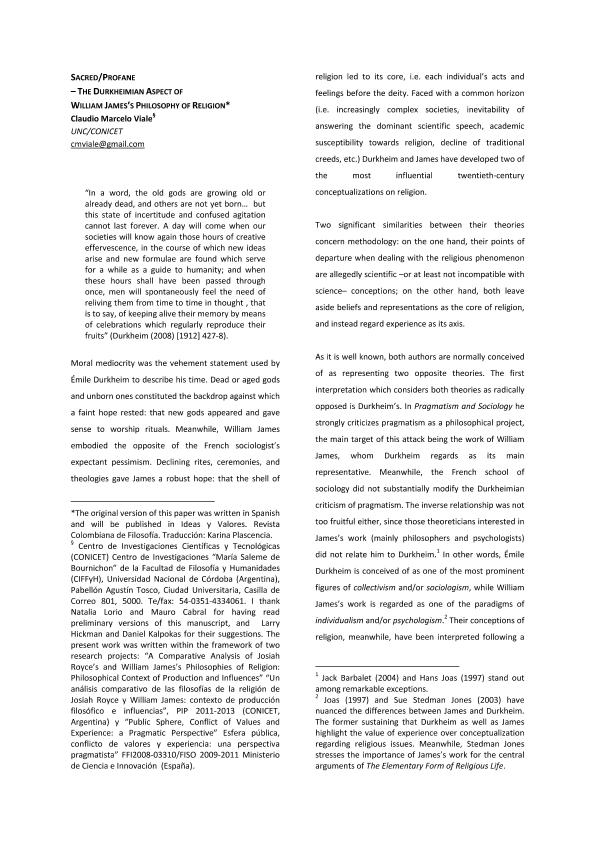Artículo
Sacred/profane: the durkheimian aspect of William James's Philosophy of religion
Fecha de publicación:
06/2012
Editorial:
Central European Pragmatist Forum
Revista:
Pragmatism today
ISSN:
1338-2799
Idioma:
Inglés
Tipo de recurso:
Artículo publicado
Clasificación temática:
Resumen
Without disregarding the differences between both perspectives, my hypothesis in this article is that James's philosophy of religion has a Durkheimian aspect. As it is well known, Durkheim considers the distinction between the sacred and the profane to be the axis of religion. For James, on the other hand, the core of religion seems to be the individual relationship with the deity, as mentioned before. The point of contact between both conceptions lies in the fact that the Jamesian definition implies a clear distinction between the sacred and the profane, which is a prototypically Durkheimian one which helps to tint the canonical version of a James who is irremediably imbued with individual Protestantism. In other words, the sacred/profane distinction is essential for James's philosophy of religion, and this point is best appreciated in his treatment of morality. Besides, this distinction is of vital importance to understand the relationships of James's philosophy with conservative as well as with liberal Protestantism. My argument unfolds in five parts. In the first one (Durkheim interprets James) I present essential aspects of the French sociologist's criticism of the pragmatist; in the second (Durkheim interprets religion) I characterize the axis of religion according to Durkheim, that is, the distinction between the sacred and the profane; in the third section (James: Durkheimianism and Individualism) I present some of the essential aspects of James's philosophy of religion and I advance my main hypothesis, namely that there is a Durkheimian aspect in James's philosophy of religion; in the fourth section (James and Durkheim: past, present, and future of religion) I briefly examine the importance of the Durkheimian aspect of the Jamesian conception of religion for its relationship with Protestantism. Finally, I put forward some conclusions.
Palabras clave:
Durkheim
,
William James
,
Pragmatism
,
Religion
Archivos asociados
Licencia
Identificadores
Colecciones
Articulos(IDH)
Articulos de INSTITUTO DE HUMANIDADES
Articulos de INSTITUTO DE HUMANIDADES
Citación
Viale, Claudio Marcelo; Sacred/profane: the durkheimian aspect of William James's Philosophy of religion; Central European Pragmatist Forum; Pragmatism today; 3; 1; 6-2012; 144-156
Compartir




